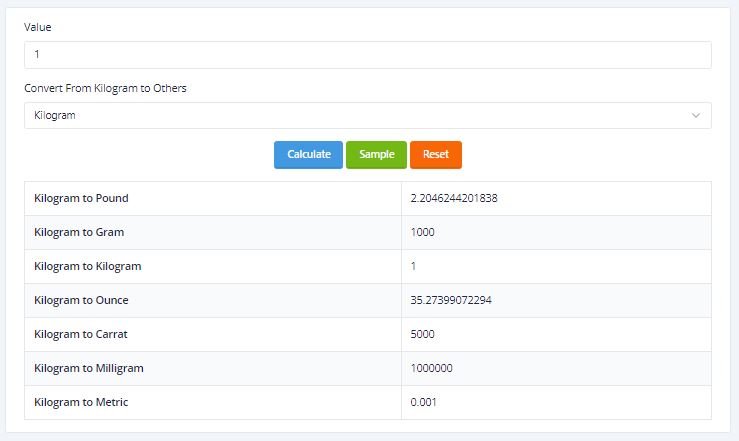Weight Converter
Unlocking the Magic of Weight Conversion: Your Comprehensive Guide

In today's fast-paced world, knowledge and convenience go hand in hand. Whether you're planning a trip overseas, following a new diet regimen, or managing a manufacturing business, understanding weight conversions is a crucial skill. In this article, we will delve into the intricacies of weight conversion, demystifying this common but often perplexing aspect of measurement.
Table of Contents
- Introduction
- Why Weight Conversion Matters
- Understanding Basic Units
- The Metric Conversion Chart
- Specialized Conversions for Various Industries
- Here are some common weight conversions:
- Tips and Tricks for Accurate Conversions
- Common Pitfalls to Avoid
- Online Tools for Easy Conversion
- Applications in Everyday Life
- Conclusion
- FAQs
Introduction
Weight conversion is the process of changing the unit of measurement for weight from one system to another. This skill is invaluable in both personal and professional life. It not only helps you understand the world better but also enables seamless communication and decision-making across borders and industries.
Why Weight Conversion Matters
Imagine you're planning a trip to Europe, and you need to know the weight limits for your luggage. The airline's website displays baggage allowances in kilograms, but your luggage scale at home reads in pounds. This is where weight conversion comes into play. Understanding how to convert pounds to kilograms and vice versa will save you from unexpected baggage fees.
Understanding Basic Units
Pounds to Kilograms
Converting pounds to kilograms is a common task. To do this, simply multiply the number of pounds by 0.45359237. For example, if you have 150 pounds, the conversion to kilograms is:
150 pounds × 0.45359237 ≈ 68.18 kilograms
Kilograms to Pounds
Conversely, converting kilograms to pounds is equally straightforward. Multiply the number of kilograms by 2.20462. For instance, if you have 75 kilograms, the conversion to pounds is:
75 kilograms × 2.20462 ≈ 165.35 pounds
Exploring Ounces and Grams
Ounces to Grams
When dealing with smaller weights like ingredients in cooking, you might need to convert ounces to grams. To do this, multiply the number of ounces by 28.3495. For instance, if a recipe calls for 8 ounces of flour, the conversion to grams is:
8 ounces × 28.3495 ≈ 226.80 grams
Grams to Ounces
Converting grams to ounces is as simple as dividing the number of grams by 28.3495. For example, if you have 200 grams of sugar, the conversion to ounces is:
200 grams ÷ 28.3495 ≈ 7.05 ounces
The Metric Conversion Chart
Milligrams to Grams
Milligrams to grams conversion is especially important in pharmaceuticals and chemistry. To convert milligrams to grams, divide the number of milligrams by 1000. For example, 5000 milligrams equal 5 grams.
Grams to Kilograms
In many scientific contexts, grams need to be converted to kilograms. This is done by dividing the number of grams by 1000. So, 1500 grams are equivalent to 1.5 kilograms.
Specialized Conversions for Various Industries
Carats to Grams
In the jewelry industry, carats are commonly used. To convert carats to grams, simply multiply the number of carats by 0.2. For instance, 5 carats equal 1 gram.
Tons to Pounds
When dealing with large quantities in industries like shipping, knowing how to convert tons to pounds is essential. To make this conversion, multiply the number of tons by 2000.
Troy Ounces to Pounds
Troy ounces are commonly used for precious metals like gold and silver. To convert troy ounces to pounds, divide the number of troy ounces by 14.58.
---------------------------------------------------------------------------------------------------------------------------------------------------------------------------------------------------------------------------------
Here are some common weight conversions:
-
Pounds to Kilograms:
- To convert pounds to kilograms, you can use the formula:
- Weight in Kilograms = Weight in Pounds × 0.45359237
- For example, if you have 150 pounds:
- Weight in Kilograms = 150 pounds × 0.45359237 ≈ 68.18 kilograms
- To convert pounds to kilograms, you can use the formula:
-
Kilograms to Pounds:
- Converting kilograms to pounds is equally straightforward. You can use the formula:
- Weight in Pounds = Weight in Kilograms × 2.20462
- For instance, if you have 75 kilograms:
- Weight in Pounds = 75 kilograms × 2.20462 ≈ 165.35 pounds
- Converting kilograms to pounds is equally straightforward. You can use the formula:
-
Ounces to Grams:
- When dealing with smaller weights like ingredients in cooking, you might need to convert ounces to grams. The formula is:
- Weight in Grams = Weight in Ounces × 28.3495
- For example, if a recipe calls for 8 ounces of flour:
- Weight in Grams = 8 ounces × 28.3495 ≈ 226.80 grams
- When dealing with smaller weights like ingredients in cooking, you might need to convert ounces to grams. The formula is:
-
Grams to Ounces:
- Converting grams to ounces is as simple as dividing the number of grams by 28.3495:
- Weight in Ounces = Weight in Grams ÷ 28.3495
- For example, if you have 200 grams of sugar:
- Weight in Ounces = 200 grams ÷ 28.3495 ≈ 7.05 ounces
- Converting grams to ounces is as simple as dividing the number of grams by 28.3495:
-
Milligrams to Grams:
- In many scientific contexts, milligrams need to be converted to grams. The formula is:
- Weight in Grams = Weight in Milligrams ÷ 1000
- For example, if you have 5000 milligrams:
- Weight in Grams = 5000 milligrams ÷ 1000 = 5 grams
- In many scientific contexts, milligrams need to be converted to grams. The formula is:
-
Grams to Kilograms:
- Grams can also be converted to kilograms by dividing the number of grams by 1000:
- Weight in Kilograms = Weight in Grams ÷ 1000
- For instance, if you have 1500 grams:
- Weight in Kilograms = 1500 grams ÷ 1000 = 1.5 kilograms
- Grams can also be converted to kilograms by dividing the number of grams by 1000:
These conversions are essential for various purposes, from cooking to travel, and understanding them can make your daily life more convenient and efficient.
---------------------------------------------------------------------------------------------------------------------------------------------------------------------------------------------------------------------------------
Tips and Tricks for Accurate Conversions
-
Use Online Converters: Numerous online tools and apps make weight conversion a breeze. They provide instant and precise results, eliminating the risk of errors.
-
Round Smartly: When dealing with real-world measurements, consider rounding to the nearest practical value to maintain precision without unnecessary complexity.
Common Pitfalls to Avoid
-
Neglecting Conversions: Ignoring weight conversions can lead to costly mistakes, especially in industries that rely on precise measurements.
-
Misreading Labels: Misinterpreting units on product labels can result in incorrect measurements, affecting recipes and project outcomes.
Online Tools for Easy Conversion
Several websites and mobile apps offer user-friendly weight conversion tools. Some popular ones include ConvertUnits, OnlineConversion, and UnitConverters.
Applications in Everyday Life
Cooking and Baking
Weight conversion is crucial for culinary enthusiasts. Many recipes use either metric or imperial measurements, and knowing how to switch between them ensures the perfect dish.
Health and Fitness
In the fitness world, weight conversion helps track progress. Whether you're monitoring your weight loss in pounds or kilograms, this skill is indispensable.
Travel and Luggage
As mentioned earlier, converting luggage weight limits from pounds to kilograms (or vice versa) can save you from excess baggage fees.
Manufacturing and Engineering
Industries rely on precise weight measurements. Engineers and manufacturers frequently convert units when designing products and machinery.
Conclusion
In our increasingly globalized world, mastering weight conversion is a valuable skill. It simplifies daily tasks, enhances decision-making, and fosters efficient communication. With the knowledge gained from this article, you're better equipped to navigate the intricacies of weight conversion.
FAQs
-
Why is weight conversion important in the jewelry industry?
- Weight conversion is essential in the jewelry industry because it allows jewelers to work with different unit systems and accurately measure precious gemstones and metals.
-
Can I use weight conversion to track my fitness progress?
- Yes, weight conversion can help you track your fitness progress, whether you prefer to measure your weight in pounds or kilograms.
-
Are there any mobile apps for weight conversion?
- Yes, there are several mobile apps available for weight conversion, making it convenient to convert weights on the go.
-
What is the difference between ounces and grams?
- Ounces












